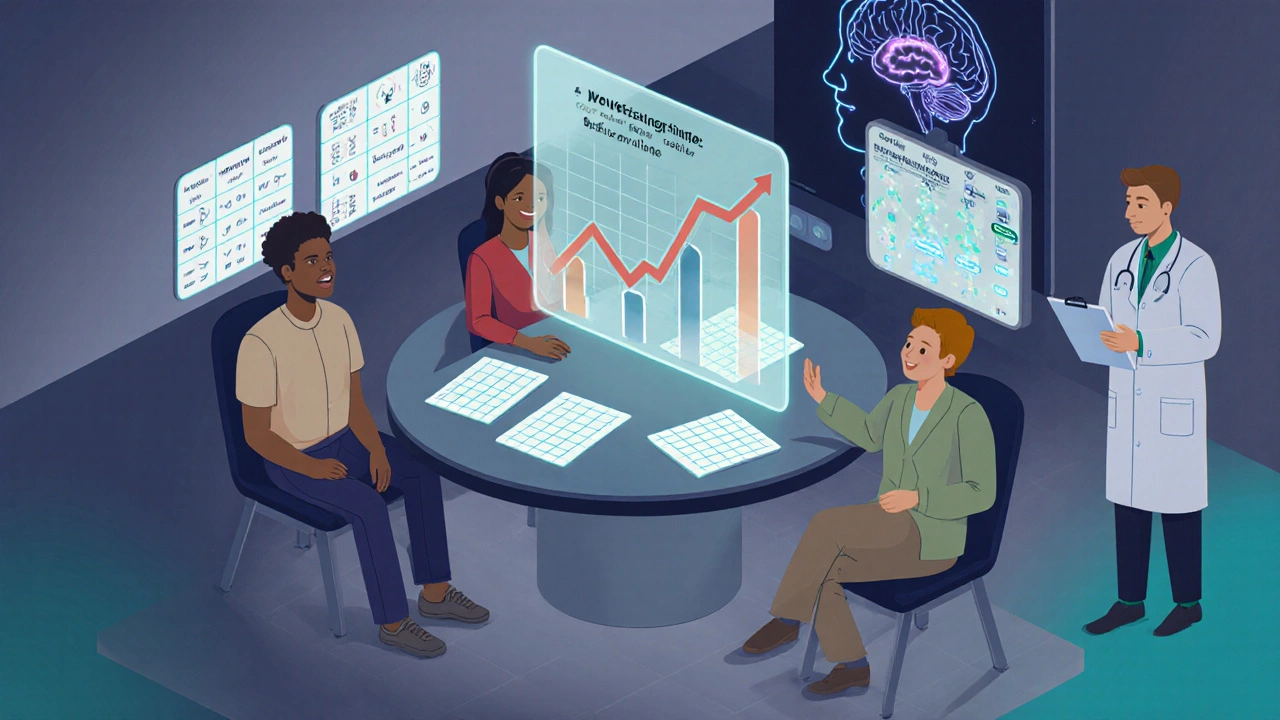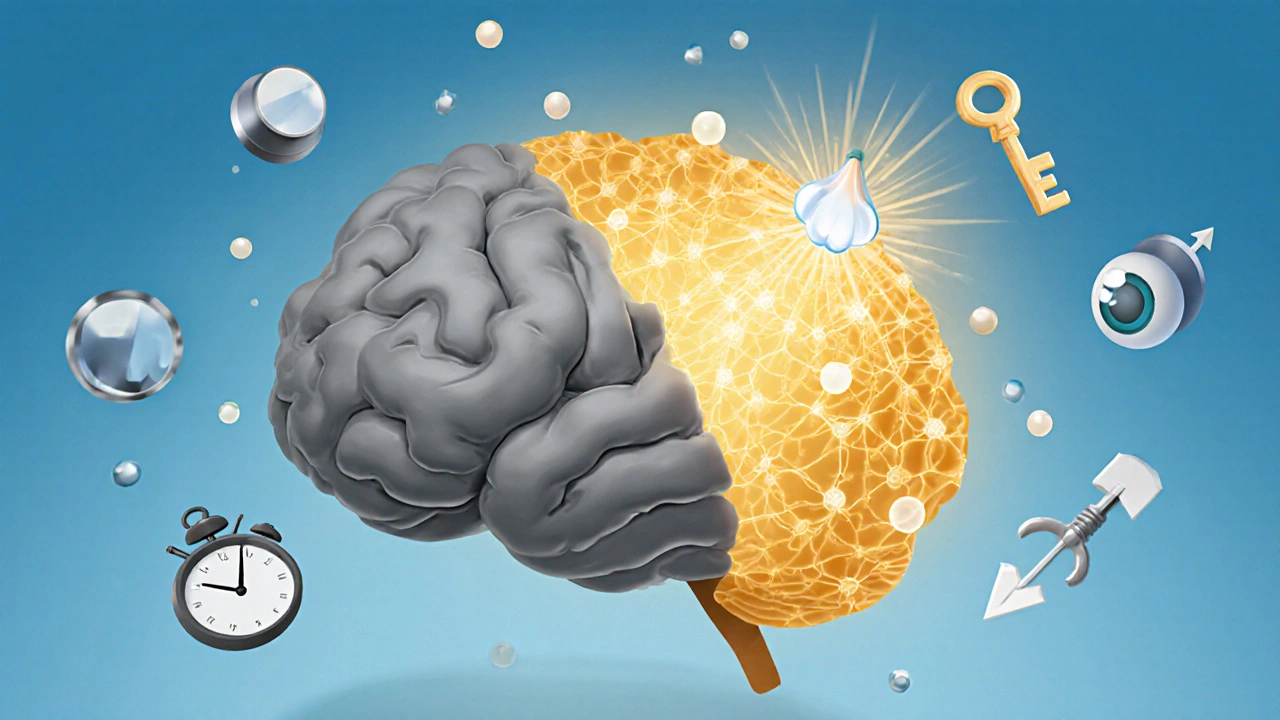Depression isn’t just feeling sad. For many, it’s a heavy, unshakable fog that dulls thoughts, slows movement, and steals motivation-sometimes even when everything else in life seems fine. Traditional antidepressants like SSRIs help millions, but they don’t work for everyone. And for those with depression tied to memory loss, brain fog, or cognitive decline, the problem runs deeper than just mood. That’s where galantamine, a drug originally used for Alzheimer’s, is starting to show surprising promise.
What is galantamine, really?
Galantamine is a natural compound found in snowdrop and daffodil plants. It was first isolated in the 1950s and later developed into a prescription medication for mild to moderate Alzheimer’s disease. Its main job? Boosting acetylcholine, a brain chemical critical for memory, learning, and attention. Unlike SSRIs that target serotonin, galantamine works on the cholinergic system-the part of the brain that fades early in Alzheimer’s and, as recent research suggests, may also be underactive in some forms of depression.
In Alzheimer’s patients, galantamine helps slow cognitive decline by blocking the enzyme that breaks down acetylcholine. But here’s the twist: people with depression-especially older adults or those with cognitive symptoms like poor concentration or mental fatigue-often show reduced acetylcholine activity too. This isn’t just correlation. Brain imaging and cerebrospinal fluid studies have found lower acetylcholine levels in depressed patients compared to healthy controls, especially in the hippocampus and prefrontal cortex.
Why might galantamine help with depression?
Depression isn’t one thing. There’s emotional depression, anxious depression, fatigue-driven depression, and what some researchers call cognitive depression-where the biggest struggle isn’t crying, but thinking. People with this subtype report brain fog, trouble focusing, slowed decision-making, and memory lapses. These symptoms don’t always improve with standard antidepressants. That’s where galantamine’s mechanism stands out.
By increasing acetylcholine, galantamine may help restore clarity. A 2023 double-blind trial published in Journal of Affective Disorders gave 84 adults with treatment-resistant depression either galantamine or a placebo for 12 weeks. Those on galantamine showed significantly better scores on cognitive tests and reported clearer thinking within four weeks-before mood improvements even kicked in. Mood improved later, suggesting that fixing the brain’s cognitive machinery might be a necessary step before emotional healing can follow.
Another study from the University of Cambridge tracked 60 older adults with depression and mild cognitive impairment. After 16 weeks of low-dose galantamine (8 mg/day), 58% showed a 50% or greater drop in depression scores. Only 22% in the placebo group did. The biggest gains? In attention span and verbal recall. These aren’t minor perks-they’re life-changing for someone who forgets appointments, loses track of conversations, or can’t follow a recipe.
How does it compare to standard antidepressants?
SSRIs like sertraline or escitalopram work on serotonin. SNRIs like venlafaxine hit serotonin and norepinephrine. Galantamine doesn’t touch either. Instead, it’s like tuning up a stalled engine-restarting a system that’s been running on fumes.
Here’s how they stack up:
| Feature | Galantamine | SSRIs (e.g., Sertraline) | SNRIs (e.g., Venlafaxine) |
|---|---|---|---|
| Primary Target | Acetylcholine | Serotonin | Serotonin + Norepinephrine |
| Onset of Cognitive Improvement | 2-4 weeks | 4-8 weeks (if at all) | 4-6 weeks (often partial) |
| Best For | Depression with brain fog, memory issues | General low mood, anxiety | Depression with fatigue, low energy |
| Common Side Effects | Nausea, dizziness, diarrhea | Sleep issues, sexual dysfunction | High blood pressure, insomnia |
| Use in Elderly | Approved, often well-tolerated | Risk of hyponatremia | Higher fall risk |
Galantamine isn’t a magic bullet. It doesn’t work for everyone. But for people whose depression feels more like a mental slowdown than sadness, it might be the missing piece.

Who might benefit most?
Galantamine isn’t for every depressed person. It’s most likely to help those who:
- Have depression along with memory lapses or trouble concentrating
- Are over 50 and have noticed cognitive decline alongside low mood
- Have tried SSRIs or SNRIs but still feel mentally sluggish
- Have a history of mild cognitive impairment or early Alzheimer’s symptoms
- Experience depression after a stroke or traumatic brain injury
It’s also being studied in people with Parkinson’s-related depression and post-COVID brain fog that won’t lift. Early results are encouraging, but still preliminary.
What are the risks and side effects?
Galantamine is generally safe when used under medical supervision. But it’s not without trade-offs. The most common side effects are digestive: nausea (affects about 30% of users), vomiting, diarrhea, and loss of appetite. These usually fade after a couple of weeks as the body adjusts.
Less common but serious risks include slowed heart rate (bradycardia), especially in people with existing heart conditions. People with asthma, ulcers, or liver disease need careful monitoring. It can also interact with other cholinergic drugs or medications that affect heart rhythm.
Unlike SSRIs, galantamine doesn’t cause weight gain or sexual side effects-big pluses for many. But it can cause dizziness or fainting if you stand up too fast. That’s why doctors usually start with a low dose (4 mg/day) and slowly increase over weeks.

Is it available now?
Yes-but only by prescription. Galantamine is FDA-approved and licensed in the UK for Alzheimer’s under brand names like Razadyne and Reminyl. It’s not approved for depression yet, so any use for depression is considered off-label. That means your doctor can prescribe it, but insurance may not cover it for this purpose.
Some psychiatrists and neurologists are already prescribing it off-label for treatment-resistant depression with cognitive symptoms. If you think you might benefit, talk to your doctor about testing for cholinergic dysfunction. Blood tests can’t measure brain acetylcholine directly, but neuropsychological testing and brain scans can point to patterns that suggest it’s worth trying.
What’s next for galantamine and depression?
Large-scale clinical trials are underway. The National Institute of Mental Health (NIMH) is funding a Phase III trial across 12 U.S. and European centers to test galantamine in 400 patients with depression and cognitive impairment. Results are expected by late 2026.
Researchers are also exploring combinations-like pairing galantamine with low-dose ketamine or mindfulness therapy. Early animal studies suggest the combo may boost neuroplasticity faster than either alone.
For now, galantamine remains a promising, under-the-radar option. It’s not a first-line treatment. But for the thousands of people who feel trapped in a fog that antidepressants can’t clear, it might be the key they’ve been waiting for.
Can galantamine be bought over the counter?
No. Galantamine is a prescription-only medication in the UK, US, and most countries. It’s not available as a supplement or OTC drug. Products claiming to contain galantamine online are unregulated, potentially unsafe, and often contain incorrect doses or harmful fillers.
How long does it take for galantamine to work for depression?
Cognitive improvements-like clearer thinking and better focus-often appear within 2 to 4 weeks. Mood improvements usually follow after 6 to 8 weeks. Patience is key. It’s not an instant fix, but the changes tend to be steady and lasting if the drug is a good fit.
Is galantamine safe for long-term use?
For Alzheimer’s patients, galantamine is often used for years with good tolerance. In depression, long-term data is still limited, but early studies suggest it’s safe for 12-24 months under medical supervision. Regular check-ups for heart rate, liver function, and digestive health are recommended.
Can I take galantamine with my current antidepressant?
Yes, in many cases. Doctors often add galantamine to existing antidepressants when cognitive symptoms persist. But combining it with other cholinergic drugs (like donepezil or rivastigmine) is dangerous and must be avoided. Always consult your doctor before mixing medications.
Does galantamine cause weight gain or sexual side effects?
No. Unlike SSRIs, galantamine doesn’t typically cause weight gain, reduced libido, or sexual dysfunction. In fact, some patients report improved energy and motivation, which can indirectly help with intimacy and daily functioning.
If you’ve been told your depression is "all in your head"-and you know it’s more than that-there may be a biological reason. Galantamine doesn’t promise a cure. But for some, it offers something just as valuable: the return of clarity, focus, and the quiet confidence that comes with a mind that works again.
